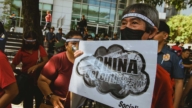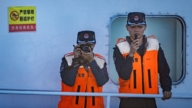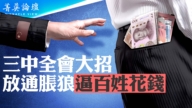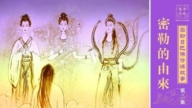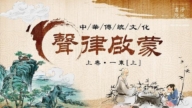【新唐人2014年05月16日讯】《美国有线电视新闻网》(CNN)报导了在中国被中共禁止的五种事物,这些禁令,是中共箝制中国境内媒体和资讯流通的途径,同时也导致在中国的西方人非常不习惯。请看报导。
《CNN》在报导中指出,这5种被中共禁止的事物是推特、脸书、网站、西方电影还有书籍。
《CNN》说,在中国境内,有上千个网站无法访问,这给西方人带来了不便,也引发了国际社会对于中共审查制度的关注。
分析家认为,中共对于“社交媒体”在2011年的“阿拉伯之春”、和2009年6月的伊朗“绿色革命”,以及同年7月,在中国新疆西部乌鲁木齐市爆发的流血暴动冲突中起的作用,感到非常不安。
旅美中国社会问题研究人士张健:“即便是没有茉莉花革命、即便是没有海外的这个大规模的群众自发游行事件、利用互联网的事件,没有这个前车之鉴,中共也不会开通。因为中共是比那些国家更要集权的。”
旅美中国社会问题研究人士张健表示,中共是靠宣传起家,非常了解宣传在人民心中的力量,为了维稳的需求、和政权的考虑,一定不会放开“推特”和“脸书”。
而另一位在大陆居住多年、曾担任台湾一家集团企业执行长的许先生表示,在中国大陆所有工作的台湾人士,好像陷入一个孤岛,几乎跟台湾的联系完全断掉。
大陆台资企业前执行长许先生:“很痛苦的就是,每次到大陆去出差的时候,或者是在那边长期工作中,往往要看一些跟工作上有关的一些信息、想要回到台湾的这些资讯的网站去看,包括台湾一些经济方面统计的一些数字或一些官方的报告、经常跟生活比较有关台湾的一些新闻网站,都完全没办法上(网)。”
不过,有人认为中共禁止中国人使用“脸书”,是为了保护中国国内的社交媒体,和保护中国国内的科技产业。
许先生:“中国本身在发展这些社群技术,基本上大慨也都是翻版国外的、去侵犯到别人的智慧财产权,包括整个社群运营的模式、或者是社群的管理。”
张健:“互联网企业它所应用的技术都是国外的技术,如果是真正保护一个企业,中共所要做的事情就是应该开放互联网、开放自己的党禁、言禁、报禁。”
《CNN》指出,在中共的严格审查下,网民被阻止访问任何网站,社交网站的聊天室也被监控。特别是那些批评共产党或谈论人权之类敏感问题的网站,都属被禁之列。
《自由亚洲电台》13号报导,“六四”前夕,官方加强清网行动,中国网民近期在社交媒体中频繁发表当年“六四”相关照片,轻则遭删,重则封号,敏感程度空前。
微博网民干小姐表示,最近封号现象比较严重。有很多网友都“转世”重新申请账号几十次了,被封号都跟“六四”有关。她预测,“删帖封号”到6月4号当天会达到顶峰,微博被关掉都有可能。
此外,新浪微博也施行新的举报机制,在举报栏中将优先处理所谓“政治敏感信息”。
许先生:“即便你是翻墙,有时候一些特定的敏感的时间,或一个特定敏感的事情发生之后,它的网管几乎不管你是一个什么的信息的网站,它是全封的。”
许先生表示,如果中共继续控制中国人的思想,相信,在中国社会造成的不安,一定会越来越严重。
今年2月,美国国务卿克里短暂访华,那期间,他与中国知名网民—-《博联社》创始人马晓霖、资深时事评论员王冲、资深调查记者王克勤,以及网络财经记者张贾龙等人会面,他们讨论了中国互联网自由等问题。当时中国网民要求美国,帮助中国渴望自由的人拆除网络防火墙,提高中国的网络自由。
采访编辑/易如 后制/陈建铭
CNN has reported that various western
influences have been banned in China
by the Chinese Communist Party (CCP).
This is as the party seeks to further suppress
Chinese media and flow of free information.
These prohibitions make Westerners uncomfortable in China.
CNN reported that Twitter, Facebook, foreign films, Casinos,
websites, books and Snapchat are all banned in China.
CNN stated that thousands of
websites are also blocked in China.
This has caused restrictions to those
inside China, including westerners.
It has led to the international community
increasingly focusing on CCP censorship.
Analysts believe that the CCP is very disturbed by the
impact of social media during the 2011 Arab Spring.
The party has also witnessed the Iranian
Green Revolution in June 2009, and bloody
riots in Urumqi in Western Xinjiang in July 2011.
Zhang Jian, U.S. based China Social Issues
Analyst: “The CCP will not open up the Internet.
Even if there had not been a Jasmine Revolution
or large-scale mass incidents or spontaneous
demonstrations overseas through the Internet.
This is because the CCP is more
totalitarian than those countries."
Zhang Jian expressed that the CCP
is maintained through propaganda.
It knows the power of propaganda
on people’s hearts and minds.
In order to safeguard it’s stability and regime,
it will undoubtedly not open Twitter or Facebook.
Mr. Xu is former resident of China, and
former CEO in Taiwanese business.
He suggests that Taiwanese businessmen in
China feel like they are living on an lonely island.
They are out of contact with Taiwan.
Mr. Xu: “When I traveled to China or worked there for
a while, I often needed some work-related information.
I needed to visit Taiwanese websites for economic
information, statistical data, official reports or regular news.
There was no way to access these
sites, and it was a very painful experience."
However, others think the ban on Facebook is to protect
China’s social media and other technological businesses.
Mr. Xu: “China’s social media technologies
are basically copies of foreign technology.
This includes the operation model
of community management."
Zhang Jian: “Internet technology was invented overseas.
To truly protect businesses, the CCP should open
up the Internet and lift bans on political parties,
freedom of speech and freedom of publication."
CNN reports that under the CCP’s strict
censorship, Internet users are prohibited
from visiting sites that criticize the CCP.
Users are also not allowed to access sites that
discuss sensitive issues such as human rights.
Search results and social media
conversations are also censored.
Radio Free Asia reported on May 13 that
officials strengthened their operations.
This is to sweep the Internet
prior to June 4 commemorations.
Chinese netizens are currently frequently
publishing photos of June 4. on social media.
These posts are removed and their
accounts are closed in certain cases.
This degree of sensitivity is extreme.
Netizen ‘Ms. Gan’ expressed that it has gotten quite serious.
Many netizens have “reincarnated" by
re-applying for new accounts dozens of times.
These are all related to June 4.
She predicted that deletion and account
closing would reach its peak day on June 4.
Even microblogs might be turned off.
In addition, microblogging at sina.com
also implemented a reporting system.
It handles politically sensitive posts as a priority.
Mr. Xu: “During some sensitive times, or on a
sensitive topic, the Internet police block all sites.
Even if you cross over the firewall, it is no use."
Mr. Xu said that Chinese society will become more unstable
if the CCP continues to try to control people’s thoughts.
In February 2014 U.S. Secretary
of State John Kerry briefly visited China.
He met renowned Chinese netizens, including
“Bolian Association" founder Ma Xiaolin.
He met senior political commentator Wang Chong,
senior investigative reporter Wang Keqin, as well
as internet financial reporter Zhang Jialong.
They discussed issues such as Internet freedom in China.
Netizens in China asked the U.S. to help
Chinese people who thirst for freedom.
They need help to dismantle the firewall,
and improve China’s Internet freedom.
Interview & Edit/Yi Ru Post-Production/Chen Jianming



